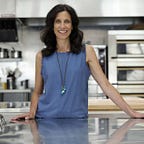Why Be Well Prepared
As a companion piece to Sparkle Wanted, Pastry Chef Nicole Plue and I talked about what she does, beyond teaching the ‘hard skills’ of the kitchen, to make sure her students graduate ready to hit the ground running. It is clear that being prepared means so much more to her than piping chocolate or mad knife skills. Harkening back to her time in some intense pro kitchens, Chef Nicole shares her advice for showing up well prepared.
When I think about what I want most for my students, instead of words a very vivid picture appears in my head based on a memory played out many afternoons in the kitchens where I’ve worked.
Picture this: It’s late in the day. I’m hot and tired already. I’m at the tail end of a busy lunch service. There’s a bit of lull as I’m wiping down counters and resetting my station, making lists of what needs to get done for an even busier dinner service. Slowly the pace starts to ramp up. The ticket machine at the station across from me starts regularly spitting out orders from the bar that’s already starting to fill with hungry folk. Just about this time, my assistant rounds the back corner, fresh jacket and apron, on deck for a night together working dinner service. When I look up and see him cutting a path towards me, I say to myself: Oh good, he’s here.
And that’s what I want for my students to inspire in the hearts and minds of their chefs from the first day, the first minute they walk in a kitchen — a sense that they are an essential member of the team, that they know how truly show up for the job in very consistent and reliable way.
To ready my students for that little moment of managerial bliss I know well (and I know the opposite. It goes something like: oh f**k, he’s here), every day in class along with learning and practicing the fundamentals of baking we practice the discipline of working in a professional kitchen. The goal is over time, through repetition and effort, as your skills are catching up to your aspirations, you are an asset to the team every shift.
After about the first week of class, when jitters are starting to fade and a reliable routine starts to set in, I start to challenge the students: “You may not know how to consistently temper chocolate…yet, or properly fold a cake batter…yet, or the right ratio for a smooth ice cream…yet, but there are a whole bunch of things that you can be doing right now, as good as anybody, that will make you an asset in any professional setting.”
What we practice every single day:
· Reading through a recipe and thoughtfully organizing your actions based on it’s logic. Bold claim: You can be a champion oven preheater Day 1.
· Walking with a sense of purpose from point A to point B.
· Focusing on the task fully. Focus is a choice you soon find out.
· Actively listening to both directions and feedback.
· Dealing with mistakes. Not defending them or assigning blame but assessing where the trouble started and moving quickly into problem solving mode. Only a brief stop at the Pity Party is ok.
· Taking good notes. Just the act of writing things down reflects professionalism.
· Asking questions at the right time, the right way.
What I’ve learned to love about any practice is that some days you do good and some days not so good but that every day is a chance to re-set and try again.
At the end of the term, my students host a pop-up bakery, the culmination of our time together in the kitchen. After the last guest leaves and we are lifting our champagne glasses, tired but thrilled, what we are toasting is not just all the delicious pastries we made but how we all came together and got the work done. Oh, good, we’re all here.
Learn more about our Professional Culinary and Pastry Programs
at SF Cooking School.
Still Hungry? Follow Us: Twitter | Facebook | Instagram | LinkedIn
